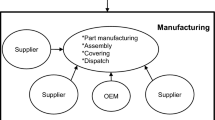Abstract
Traditional theories and principles on supply chains management (SCM) have implicitly assumed homogenous cultural environment characteristics across the entire supply chain (SC). In practice, however, such an assumption is too restrictive due to the dynamic and non-homogenous nature of organisational cultural attributes. By extending the evolutionary platform of cultural algorithms, we design an innovative multi-objective optimization model to test the null hypothesis – the SC’s performance is independent of its sub-chains cultural attributes. Simulation results suggest that the null hypothesis cannot be statistically accepted.
Preview
Unable to display preview. Download preview PDF.
Similar content being viewed by others
References
Chopra, S., Meindl, P.: Supply Chain Management: Strategy, Planning, and Operations. Prentice Hall College, Englewood Cliffs (2001)
Harrison, T.P., Lee, H.L., Neale, J.J.: The Practice of Supply Chain Management. Kluwer Academic Publishing, Dordrecht (2003)
Truong, T.H., Azadivar, F.: Simulation Based Optimization for Supply Chain Configuration Design. Presented at the Winter Simulation Conference, Piscataway, NJ (2003)
Joines, J.A., Kupta, D., Gokce, M.A., King, R.E., Guan, K.M.: Supply Chain Multi-Objective Simulation Optimization. Presented at the 2002 Winter Simulation Conference (2002)
Al-Mutawah, K., Lee, V., Cheung, Y.: Modeling Supply Chain Complexity using a Distributed Multi-objective Genetic Algorithm. In: Gavrilova, M.L., Gervasi, O., Kumar, V., Tan, C.J.K., Taniar, D., Laganá, A., Mun, Y., Choo, H. (eds.) ICCSA 2006. LNCS, vol. 3980, pp. 586–595. Springer, Heidelberg (2006)
Reynolds, R.G.: An Introduction to Cultural Algorithms. Presented at Third Annual Conference on Evolutionary Programming, River Edge, NJ (1994)
Shafer, G.: A Mathematical Theory of Evidence. Princeton University Press, Princeton (1976)
Reynolds, R.G., Peng, B.: Cultural Algorithms: Modeling of How Cultures Learn to Solve Problems. Presented at 16th IEEE International Conference on Tools with Artificial Intelligence (ICTAI 2004), Boca Raton, FL, USA (2004)
Reynolds, R.G., Peng, B.: Knowledge Learning in Dynamic Environments. Presented at IEEE International Congress on Evolutionary Computation (2004)
Author information
Authors and Affiliations
Editor information
Editors and Affiliations
Rights and permissions
Copyright information
© 2006 Springer-Verlag Berlin Heidelberg
About this paper
Cite this paper
Al-Mutawah, K., Lee, V., Cheung, Y. (2006). An Intelligent Algorithm for Modeling and Optimizing Dynamic Supply Chains Complexity. In: Huang, DS., Li, K., Irwin, G.W. (eds) Intelligent Computing. ICIC 2006. Lecture Notes in Computer Science, vol 4113. Springer, Berlin, Heidelberg. https://doi.org/10.1007/11816157_118
Download citation
DOI: https://doi.org/10.1007/11816157_118
Publisher Name: Springer, Berlin, Heidelberg
Print ISBN: 978-3-540-37271-4
Online ISBN: 978-3-540-37273-8
eBook Packages: Computer ScienceComputer Science (R0)




